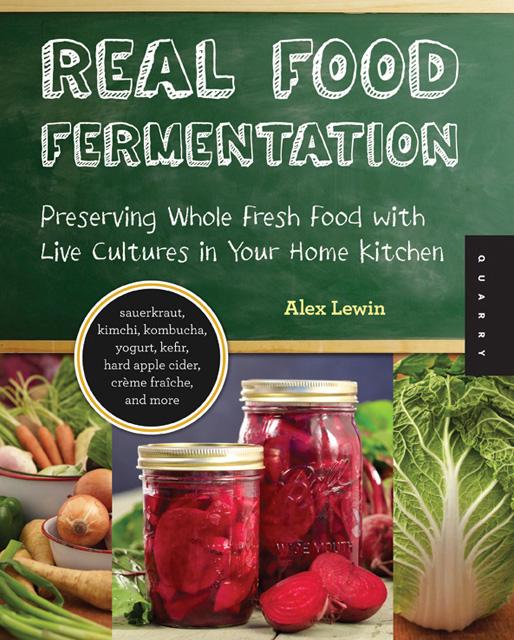Earlier this month I published an interview with fermentation expert Alex Lewin discussing the importance of including fermented foods in a modern diet. In this next conversation we get right down to fermenting specifics, from the top health benefits to the best recipes and essential kitchen items you'll need to get started. Enter Alex...
What was your first ferment?
Kimchi. I became interested in kimchi before I understood the whole fermenting thing. I found a recipe on the internet and followed it without really knowing what was going on with the fermentation part of it.
Which recipe is your favorite now?
I’m pretty fond of the Fermented Carolina Slaw recipe in my book. I think that brings something new to the table and at the same time it’s accessible. I haven’t met a lot of people who admit they don’t like it, but then again maybe they’re just being nice. It seems to be a crowd-pleaser and more to the point, it is an Alex-pleaser, which was really your question.
Based on your experience and research, what would you name as the top 3 benefits of fermented foods?
Let’s see…here are my top three:
1) It gets you in the kitchen doing stuff with food. It is important for people just to get their hands on food and starting to think about food. Fermentation helps with this idea of raising food consciousness that we talked about before.
2) Digestibility. A lot of fermented foods are more digestible than their non-fermented counterparts. For example there are tons of people who can eat yogurt and cheese who would have a hard time drinking milk. Especially because one big hunk of cheese is the result of a gallon or two of milk. I challenge you to drink a gallon of milk instead of eating cheese! You still get most of the nutrients from the milk in the cheese, just in a more digestible form. The same thing applies to bread versus eating wheat as a grain or fermented soy versus chewing on a soybean. Not only are fermented foods more digestible, but they will improve your digestion of other things too. This is particularly true of kombucha, kefir and other ferments that contain a wide range of microbes. To all of the people out there taking Zantac and Rolaids in an attempt to fix digestion with pills or mitigate symptoms— I’ve heard from many people that once they start drinking kombucha their digestion improves, they can stop taking medications, and they’re a lot happier in general.
3) Taste, fun and enjoyment! Obviously wine, beer, mead and cider are fun and delicious for most people. But chocolate, coffee, olives, cheese, bread, kimchi, sauerkraut, soy sauce, and miso are also fermented. In fact so many of our favorite foods and signature dishes from different countries are fermented. If we took all of these away we would have a much more boring time eating.
If I could throw in a 3 ½ here it would be increased vitamins and enzymes. As a byproduct of microbe metabolism vitamins and enzymes are produced— and not weird vitamins either: things like vitamins C and B in meaningful quantities.
Which recipe would you recommend for beginners to start with?
Sauerkraut is the most simple. There are all sorts of things that are doable: kimchi, kombucha, dairy ferments. But sauerkraut is a solid starting point and more complicated things can be added from there.
If you could offer one piece of advice to all new fermenters what would that be?
Relax and don’t worry. Don’t be afraid to experiment a little and try different things to see what works for you. Some people insist that if you are making sauerkraut you need an airlock in a closed environment and that you must be very meticulous about it. Other people insist that the only thing you want to do is just cover your ferment with a cloth to keep the bugs out. The truth is that you can do it lots of different ways in lots of different containers. In my book I talk about what works best for me and what I do, but there are so many ways. The stakes are pretty low if you are making sauerkraut. Cabbage is pretty cheap and you’re not going to poison yourself. If the worst thing to happen is that you have to throw away some sauerkraut, it’s not a big deal.
What do you consider a “must-have” when it comes to kitchen equipment for preparing fermented foods?
Again there are a variety of methods that will work—but I think a water filter is pretty much a must-have for fermenting and for life. Among other things, chlorine is added to municipal water supplies to kill microbes so that whatever the water picks up on its way to you isn’t going to hurt you. Killing microbes however, is not what we want for fermenting. So at the very least you have to remove the chlorine from the water and while you are at it you might as well remove the lead and the mercury and whatever else might be lingering there too. There are lots of water filters, but any water filter is better than none. And to the readers out there, I didn’t really think about this until now, but that was an organic response and not a premeditated plug for Radiant Life water systems!
Have you been working on any other food-related projects recently that you’d like to share with us?
Not that I am ready to share yet, but if you check my blog and social media pages I’ve put some hints out there and more announcements may come soon.

